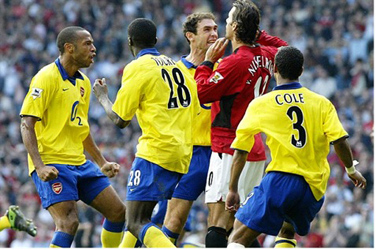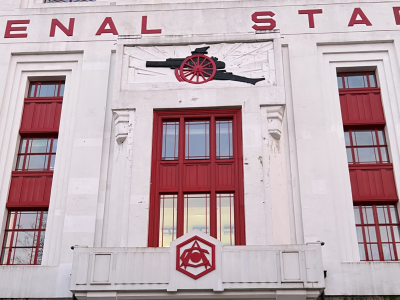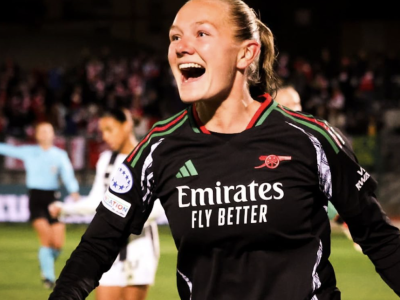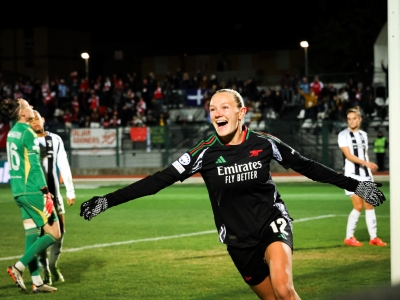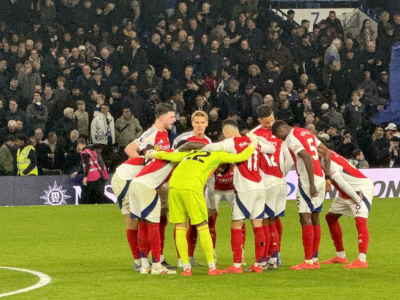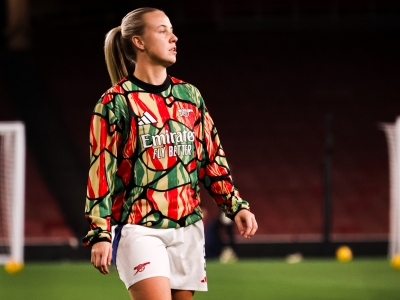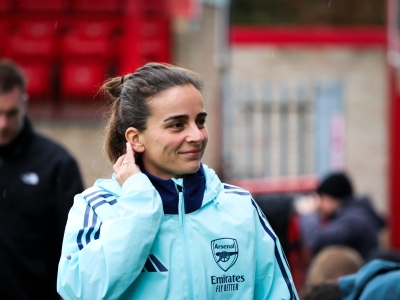Previous Flashbacks for Man United at Home can be found here and here, while yesterday’s edition on Man United away can be found here.
On November 6th 1986, United Chairman Martin Edwards would appoint Alex Ferguson as boss at Old Trafford and one month into Fergie’s reign, with United two points off the bottom of the table Tottenham would visit Old Trafford in front of a live Match of the Day audience. United raced into a two goal lead with Whiteside and Davenport on the scoresheet. However a superb header from Gary Mabbutt, a comedic own goal from Kevin Moran and a goal from Clive Allen in his annus miribulus season put Spurs 3-2 up, before a late penalty from Davenport evened the scores up with the match ending in a 3-3 draw. The first big victory of the Ferguson era however came on Boxing Day of 1986, with a 1-0 win over Liverpool at Anfield secured by a goal from Norman Whiteside.
At the time of Arsenal’s first visit to Old Trafford during the Ferguson era, the Gunners were top of the League table and unbeaten for seventeen games, while United still were languishing in the bottom half of the table in thirteenth position. This match if anything would be ground zero in the long running feud between the two sides that would stretch well into the next century. Ten minutes into the second half, Gordon Strachan would give United the lead. Not long after David Rocastle would pick up the only red card of his career. As Alex Ferguson would admit some years later: ‘it was one of those games when big Norman did about 45 fouls and never got booked. How he got away with it I’ll never know!’ A nineteen year old Rocky however would kick out at Whiteside in retaliation and as a result receive his marching orders. A late second from Terry Gibson sealed Arsenal’s fate with a 0-2 defeat.
This fixture would also be Alex’s first clash with an Arsenal manager, as he and George Graham would unsurprisingly argue in the tunnel. Fergie described in his autobiography that: ‘I can’t remember what the argument was about…but there we were in the tunnel, typical Scots, at each other’s throats – and we hadn’t even had a drink’. What is incredible however is that not a shred of video evidence of this game seems to be in existence. Such is the recent nature of Football’s saturation coverage on television, that such a turning point in the modern history of both clubs was never captured at all, in any form for posterity. United finished the 1986/87 season in eleventh position, while Arsenal would finish fourteen points above them in fourth place.
United’s first home game of the 1987/88 season would be Arsenal’s visit to Old Trafford. This would be the Gunners’ last visit to Old Trafford not to be caught by the cameras. Thankfully the match ended in a 0-0 draw so there wasn’t much to capture. United had a much improved 1987/88, finishing runners up to Liverpool, however at nine points behind were never really in the title race but pulled off a 3-3 draw at Anfield in April, coming back from two goals down with ten men. In 1988/89 United brought Mark Hughes back to Old Trafford, however seem to go backwards after failing to win eleven out of twelve games (which included six straight draws) over a three month period between September and Christmas which left them hovering in mid table.
The undoubted highlight of the 1988/89 season would be a 3-1 win over Liverpool on New Years’ Day, which would come during a run of six wins out of seven which pushed United up to third, built on the rise of Fergie’s original fledglings such as Lee Martin, Lee Sharpe, Mark Robins and Russel Beardsmore. The feelgood factor however would wear off by the end of February after a run of three victories in their last fourteen games to sink to a final finishing position of eleventh, behind Millwall! During that run however came Arsenal’s visit to Old Trafford at the start of April (in front of just 37,977 fans!), after Liverpool would begin to emerge as the main title challengers after beating second place Norwich twenty four hours earlier.
Arsenal unveiled a new sweeper system with Bould, Adams and O’Leary all incorporated at the back – a system which Arsenal would stick with until the season’s end. Tony Adams would give Arsenal the lead with a header from a corner, looking like Arsenal would go five points clear at the top. However a second half howler from Adams putting the ball into his own net meant that lead would be reduced to just three after a 1-1 draw at Old Trafford. For some reason, the Daily Mirror saw fit to put Adams on its back page with a pair of Donkey ears under the headline of ‘EE-HAW’, which aided a huge amount of barracking from away support across the country. TA though would have the last laugh that year in becoming one of the youngest ever players to captain a title winning side.
A spending spree in the summer and early autumn of 1989 however would be the death kneel for Fergie’s original fledglings, as Fergie paid £750,000 for Mike Phelan - the captain of surprise title challengers from the season prior, Norwich City, as well as £1.5 million for Neil Webb - a mainstay of Cloughie’s midfield at Nottingham Forest. In mid-August a takeover bid was launched by Millionaire property tycoon Michael Knighton, to buy the club from the Edwards family who had run United since the 1960s. Twenty four hours on prior to the visit of League Champions Arsenal to Old Trafford, in an act of shameless publicity by Knighton, he donned a United shirt juggling a ball in front of the Stretford End.
The match which followed saw United take the lead with a Steve Bruce header, however a penalty save by John Lukic from a Brian McClair penalty, as well as David Rocastle equalising with a header. Adams however left the game with an illness, to be substituted for Gus Caesar. In the second half however goals from Mark Hughes, an excellent volley from Neil Webb on his debut and a goal from Brian McClair inflicted a 1-4 defeat on the Gunners, with the front cover of that week’s edition of The Gooner fanzine remarking that the Gunners had sunk from top to bottom of the league within the space of two hours.
United allowed Ferguson to spend more funds, breaking the British transfer record after paying Middlesbrough £2.3 million for Gary Pallister, £1 million for West Ham’s Paul Ince and £1.3 million for Southampton’s Danny Wallace, taking United’s spending close to a then eye-watering figure of £7 million. The opening day hammering of Arsenal however would be United’s only victory in the first five games of the season. Their next victory would be a 5-1 win over Millwall, however the following week would be on the receiving end of the same score line, as City battered United 1-5 at Maine Road, to which Fergie would claim that: ‘I was as close to putting my head in the oven as I’d ever been and I think there would have been plenty of volunteers to turn on the gas had I done so’.
To compound matters, in October the deal with Michael Knighton collapsed after his financial backers pulled out, meaning that Knighton was unable to raise the £20 million required. On the pitch, after a run of eleven games without a win by February United were languishing in seventeenth position and just one point above the relegation zone. United however finished the season five points above the drop zone, though their season was saved by their successful FA Cup run that season, though had a close run Semi Final with local rivals Oldham Athletic at Maine Road who they eventually disposed of after a replay.
In 1990/91, United’s league form improved. An unbeaten Arsenal visited Old Trafford in October and took a first half lead with Anders Limpar scoring from a short corner (and looking at it closely was as far over the goal line as England’s third goal in the 1966 World Cup Final). The real drama however took place in the second half when a long running feud between Nigel Winterburn and Brian McClair boiled over after a sandwich tackle between him and Limpar lead to McClair kicking Winterburn while he was grounded and a twenty one man brawl ensued. Arsenal won the game 1-0, however following their part in another brawl a year earlier were deducted two points as a result (United deducted one point).
The points deduction left Arsenal eight points adrift of Liverpool at the top, however a stirring team talk from George Graham following the tribunal decision (as seen here) rallied the troops. Arsenal of course went on to win the league by seven clear points despite the points deduction. Man United finished in sixth position, three points behind their neighbours City however reached two Cup Finals that season, winning the European Cup Winners Cup in the first season after the Post-Heysel ban, however losing the 1991 League Cup Final to second tier Sheffield Wednesday who were managed by Fergie’s predecessor Ron Atkinson.
The 1991/92 season was Alex Ferguson’s first sustained League title challenge. Arsenal visited Old Trafford almost a year to the day from the ‘Battle of Old Trafford’ brawl. This time United were unbeaten and top of the League, six points clear of Arsenal. Steve Bruce gave United the lead, however David Rocastle equalised with a superb run and chip of Peter Schmeichel from over twenty yards out, resulting in a 1-1 draw. United were up against their old foes Leeds United, who were revitalised on returning to the top tier two seasons earlier and captained by Old Trafford old boy Gordon Strachan. One player who appeared on English football’s horizon this season was Eric Cantona who was lined up to join Trevor Francis’s Sheffield Wednesday but ended up at Leeds United instead to boost their title chances.
United won their first ever League Cup in 1-0 win over Nottingham Forest in 1991/92, but the League title still alluded them after blowing the title run in with three defeats in a row against Nottingham Forest, West Ham and a 0-2 defeat to Liverpool at Anfield which handed the title to Leeds United. Early on in the inaugural Premiership season it looked like United’s run without a title would continue, as Man. United failed to win their first three games of the Premiership era. The first ever goal of the Premiership era would be scored against Man United by Brian Deane as Sheffield United inflicted a 1-2 defeat on Man United. By late November United were languishing in tenth position after seven games without a victory, however the turning point of the season came with the signing of Eric Cantona from Leeds United.
Many will have forgotten all these years later that most United fans were actually disappointed at Ferguson signing Cantona rather than Sheffield Wednesday’s David Hirst, who Fergie had pursued but failed to land. One of Cantona’s earliest noteworthy contributions to the United cause was a late equaliser in a 3-3 away draw against Sheffield Wednesday on Boxing Day, where the Reds came back from three goals down. By the time of Arsenal’s visit to Old Trafford in late March, United would be two points off of Aston Villa at the top of the table and involved in a three horse race with Norwich also in contention. Arsenal had a few good chances, with Merson hitting the bar from twenty yards out with the game ending in a 0-0 draw. United had dropped to third after Norwich beat League leaders Villa on the same night, but United had a game in hand.
Arsenal’s visit however would be the last points dropped by United that season, after the Reds would go on a run of seven straight wins until the end of the season. A 3-0 win over Chelsea at Old Trafford put United on the verge of the title, which was sealed a few days later after Aston Villa lost away at Oldham. Arsenal also won both domestic Cups that season, with hopes high that the Gunners may be able to challenge United in the League in the 1993/94 season. When the two sides met at Old Trafford in late September, they were both level on points at the top of the Premiership. A superb Eric Cantona free-kick however inflicted a 0-1 defeat on the Gunners, which had been Arsenal’s first defeat at Old Trafford for four years. United won the title by again the following May losing just four games all season with Arsenal twenty one points behind in fourth place. United also added the FA Cup for their first ever Double.
In 1994/95, the gap would stretch to a thirty seven point difference between the two sides, with Arsenal languishing in twelfth position. By the time of Arsenal’s next visit to Old Trafford in March 1995, George Graham had been sacked by Arsenal with his assistant Stewart Houston filling in until the end of the season. Eric Cantona would also be serving a nine month suspension after attacking a fan during a 1-1 draw away at Crystal Palace in January. United inflicted a 0-3 defeat on the Gunners with goals from Mark Hughes, Lee Sharpe and Andrei Kanchelskis in his last appearance for Man United before being sold to Everton over the summer. United however failed to retain their title, losing out to Blackburn Rovers by one point after a 1-1 draw at West Ham on the last day.
In late March 1996, Arsenal would again succumb to an Eric Cantona wonder goal, after the Frenchman returned from suspension to inspire a team made up of Fergie’s new fledglings. United inflicted a 0-1 defeat to go ahead of Newcastle at the top of the table, on their way to second League and FA Cup Double winning season. This would be Arsenal’s only visit to Old Trafford during the Stewart Houston era. The following season, Arsene Wenger had been newly installed at Highbury and would visit Old Trafford for the first time in Mid-November two points off of the top of the table having lost only one League game. United on the other hand had just suffered three League defeats on the trot, conceding a total of thirteen goals in all three. A defensive mix up led to a Nigel Winterburn own goal, as United inflicted a 0-1 defeat and Arsenal’s fourth straight loss at Old Trafford.
The incident would also be noteworthy for the beginning of a spat that would rage through both fixtures that year, as Ian Wright alleged that Peter Schmeichel racially abused Ian Wright after the latter committed a foul on him – a claim supposedly backed up by a lip reader. Schmeichel was never charged and such was the bad blood between them that the pair would refuse a PR handshake in front of the cameras, however would happily sit next to one another as fellow pundits on Match of the Day some years after this event in a more cordial fashion than Alan Shearer manages with Ruud Gullit. Eric Cantona retired after United won the title again in 1996/97, however Arsene Wenger would win his first Old Trafford encounter in 1997/98.

